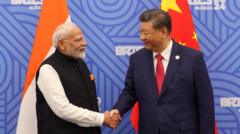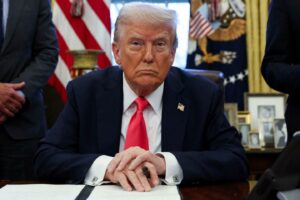Analysts predict that ongoing legal challenges against the Adani Group will have minimal impact on India's ambitious renewable energy goals.
Bribery Allegations Against Adani: Implications for India's Clean Energy Vision

Bribery Allegations Against Adani: Implications for India's Clean Energy Vision
Amidst allegations of bribery, can India's green energy aspirations remain on track?
Despite recent bribery charges from a U.S. court against the billionaire Gautam Adani's conglomerate, India's clean energy initiatives are expected to persevere, according to industry experts. India has pledged to achieve 500 gigawatts (GW), or half of its energy needs, from renewable sources by 2032—a target that relies significantly on contributions from the Adani Group. Experts suggest that while the ongoing legal troubles may temporarily hinder the group's expansion, they are unlikely to derail national objectives.
India's clean energy sector has witnessed remarkable growth over the last decade, outpacing major economies in renewable energy capacity addition, as reported by the International Energy Agency. Currently, approximately 45% of India's power generation capacity, nearly 200GW, is derived from non-fossil fuel sources, showing a five-fold increase in installed clean energy infrastructure.
The Adani Group, a key player in this sector, is set to deliver about 10% of the nation's targeted renewable capacity by contributing 50GW by 2030, backed by Gautam Adani's ambitious $100 billion investment pledge. The core of this vision is the Khavda facility in Gujarat, touted as the world's largest clean energy plant, generating up to 30GW.
However, the legal repercussions from the U.S. indictment suggest a need for caution. As allegations surface that the Adani Group bribed Indian officials to secure power contracts, the group's immediate responses have included halting a $600 million bond offering and facing a negative shift in credit ratings from major agencies. These challenges may limit the group’s capacity to secure funding, with international lenders reassessing their ties due to growing regulatory scrutiny.
Despite the turbulence, some analysts argue the group's challenges could present opportunities for competitors, such as Tata Power and Goldman Sachs-backed ReNew Power, to capture a larger share of the burgeoning market. Market fundamentals remain robust, and demand for renewable energy continues to exceed supply, indicating a healthy investment climate.
However, multiple obstacles still cloud the horizon, predominantly stemming from bureaucratic hurdles rather than funding shortages. Regulatory constraints faced by state-run power distribution companies, alongside their reluctance to sign purchase agreements for renewable energy, pose significant challenges. An obscure tender process, including a controversial 8GW solar contract at the center of the indictment, underscores these operational inefficiencies.
The situation calls for reforms within bidding and tendering processes to ensure clarity and efficiency, minimizing risks for developers and investors alike. As the legal landscape surrounding the Adani Group evolves, the focus will remain on monitoring the broader impact on India’s green energy vision.
The Adani Group maintains confidence in its commitment to achieving its renewable capacity targets by 2030, displaying resilience amidst the current turmoil.
India's clean energy sector has witnessed remarkable growth over the last decade, outpacing major economies in renewable energy capacity addition, as reported by the International Energy Agency. Currently, approximately 45% of India's power generation capacity, nearly 200GW, is derived from non-fossil fuel sources, showing a five-fold increase in installed clean energy infrastructure.
The Adani Group, a key player in this sector, is set to deliver about 10% of the nation's targeted renewable capacity by contributing 50GW by 2030, backed by Gautam Adani's ambitious $100 billion investment pledge. The core of this vision is the Khavda facility in Gujarat, touted as the world's largest clean energy plant, generating up to 30GW.
However, the legal repercussions from the U.S. indictment suggest a need for caution. As allegations surface that the Adani Group bribed Indian officials to secure power contracts, the group's immediate responses have included halting a $600 million bond offering and facing a negative shift in credit ratings from major agencies. These challenges may limit the group’s capacity to secure funding, with international lenders reassessing their ties due to growing regulatory scrutiny.
Despite the turbulence, some analysts argue the group's challenges could present opportunities for competitors, such as Tata Power and Goldman Sachs-backed ReNew Power, to capture a larger share of the burgeoning market. Market fundamentals remain robust, and demand for renewable energy continues to exceed supply, indicating a healthy investment climate.
However, multiple obstacles still cloud the horizon, predominantly stemming from bureaucratic hurdles rather than funding shortages. Regulatory constraints faced by state-run power distribution companies, alongside their reluctance to sign purchase agreements for renewable energy, pose significant challenges. An obscure tender process, including a controversial 8GW solar contract at the center of the indictment, underscores these operational inefficiencies.
The situation calls for reforms within bidding and tendering processes to ensure clarity and efficiency, minimizing risks for developers and investors alike. As the legal landscape surrounding the Adani Group evolves, the focus will remain on monitoring the broader impact on India’s green energy vision.
The Adani Group maintains confidence in its commitment to achieving its renewable capacity targets by 2030, displaying resilience amidst the current turmoil.























